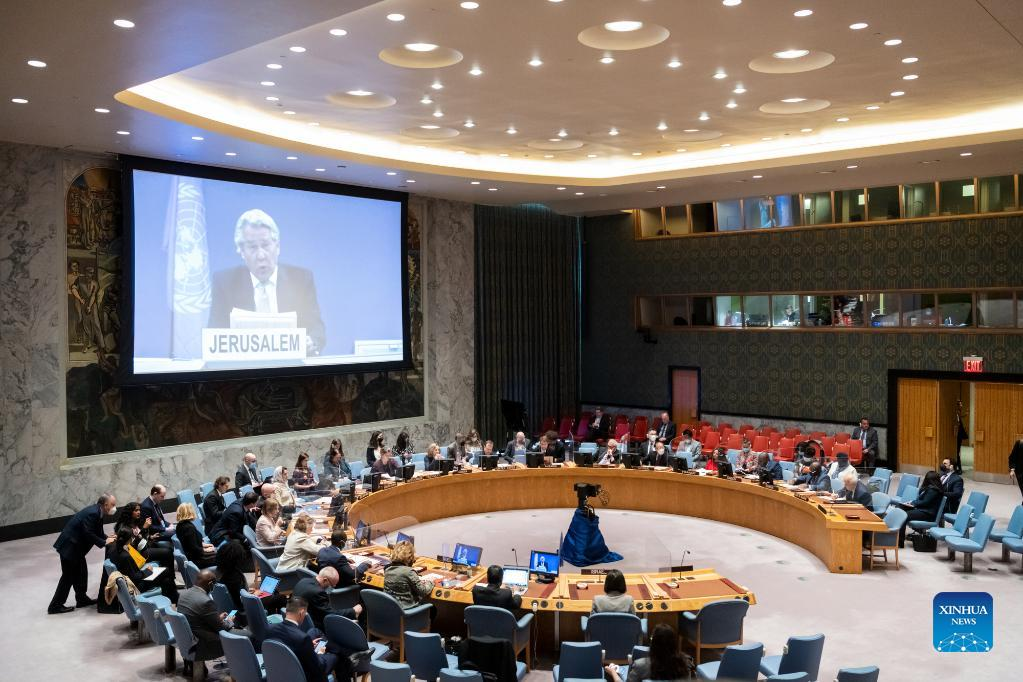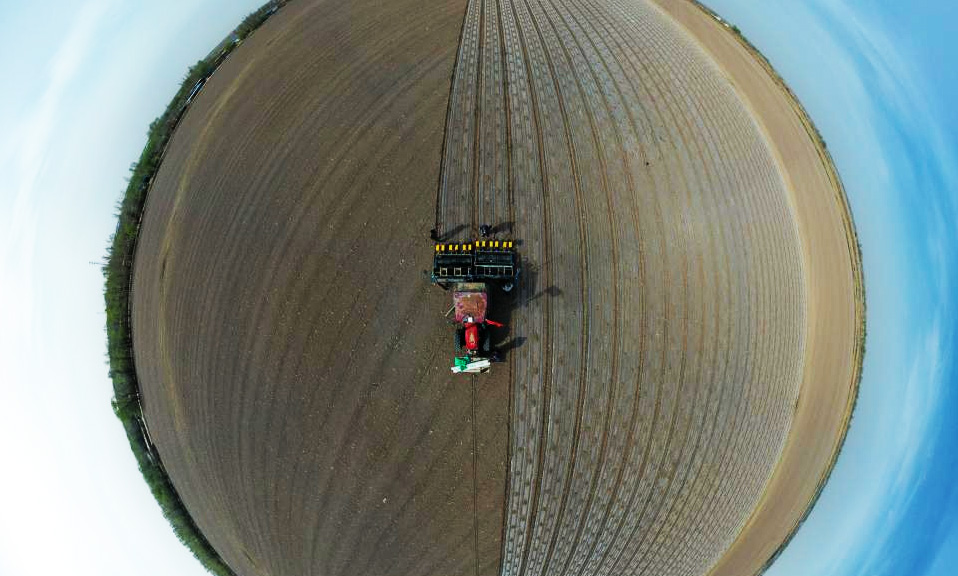UN Mideast envoy calls for real progress in peace process to stem violence

UN Special Coordinator for the Middle East Peace Process Tor Wennesland (on screens) speaks via a video link at a Security Council meeting on the situation in the Middle East, including the Palestinian question, at the UN Headquarters in New York on April 25, 2022. Tor Wennesland on Monday called for real progress in the peace process to stem violence. (Mark Garten/UN Photo/Handout via Xinhua)
UNITED NATIONS, April 25 (Xinhua) -- UN Special Coordinator for the Middle East Peace Process Tor Wennesland on Monday called for real progress in the peace process to stem violence.
"The violence and spiraling tensions of the past month have underscored, yet again, that efforts to manage the conflict are not a substitute for real progress toward resolving it," he told the UN Security Council in a briefing. "We must work immediately to lower tensions and maintain calm. In parallel, collective efforts are needed to address the conflict drivers."
Reducing violence and halting settlement activity, while shoring up the Palestinian Authority's fiscal stability and strengthening Palestinian institutions, are crucial. Steps to improve economic conditions must be implemented in a way that lays the foundation for a return to a meaningful political process, he said.
A serious escalation is avoidable. A sustained calm can open the space for more serious discussions about further improvements and perspectives, he said.
"We must not lose sight of the imperative to end the occupation and advance toward a two-state reality. The ultimate goal remains clear: two states, living side-by-side in peace and security, in line with UN resolutions and international law. The United Nations remains committed to supporting Israelis and Palestinians to move toward that future, even as they address pressing political, security, economic and humanitarian concerns and needs. We will continue to work with the parties and with regional and international partners to achieve this goal," said Wennesland.
As the holy month of Ramadan coincided with the Christian Easter and Jewish Passover celebrations, violence broke out in the occupied West Bank, including East Jerusalem, and terror attacks took place in Israel, he said.
"Let me be clear: there is no justification for acts of terrorism or violence against civilians. Violence, provocations and incitement must stop immediately and be unequivocally condemned by all," said the UN envoy. "I also reiterate that political, religious and community leaders on all sides must continue to do their part to reduce tensions, uphold the status quo at the Holy Sites, and ensure their sanctity is respected by all."
Security forces must exercise maximum restraint and use lethal force only when strictly unavoidable in order to protect life, he said.
The security, humanitarian and economic situation in Gaza remains deeply troubling. Palestinians in Gaza continue to suffer as a result of years of severe economic and movement restrictions resulting from the Israeli closure regime, as well as the nature of Hamas rule and the ongoing threat of violence, said Wennesland.
After several months with no rocket fire, militants in Gaza launched five rockets toward Israel, with one landing in the Israeli town of Sderot and causing property damage. In retaliation, the Israel Defense Forces conducted airstrikes against what it said were Hamas targets in Gaza, with no injuries reported, he noted. "I reiterate that the indiscriminate launching of rockets toward Israeli population centers violates international law and must stop immediately."
The fiscal condition of the Palestinian Authority (PA) remains precarious. While PA revenues have risen in recent months, expenditures continue to grow and adequate budget support from donors has not been forthcoming, making it increasingly difficult for the PA to address outstanding debts and make critical investments in the economy and its people, he said.
Following the outbreak of the conflict in Ukraine, rising prices and market disruptions, which are taking place across the Middle East, threaten food security levels of vulnerable families in the occupied Palestinian territory. Spiking international prices for construction materials will also impact reconstruction efforts in Gaza. Without additional funding, the World Food Programme and the UN Agency for Palestine Refugees will not be able to meet the food needs of the Palestinian population this year, which can have a destabilizing impact across the occupied Palestinian territory, particularly in Gaza, he warned.
The parties and regional and international partners must work in concert to move the PA onto a firmer fiscal footing, while addressing broader systemic issues, he said.
Photos
 World Book Day: Let's read together
World Book Day: Let's read together Rare silver pheasants flock together in greater numbers to forage at Yishan nature reserve in east China's Jiangxi
Rare silver pheasants flock together in greater numbers to forage at Yishan nature reserve in east China's Jiangxi Young artist takes up brush to create lifelike paintings expressing mankind and nature’s harmonious co-existence
Young artist takes up brush to create lifelike paintings expressing mankind and nature’s harmonious co-existence Cutton farming in full swing in China's Xinjiang
Cutton farming in full swing in China's Xinjiang
Related Stories
- UN secretary-general to visit Turkey before having talks in Russia, Ukraine: ministry
- UN calls for continuous support for Lebanon in hosting refugees after deadly boat crash
- UN chief urges stronger global cooperation as multilateralism under threat
- UN chief welcomes efforts to promote peace in DR Congo, East Africa
- Somalia, UN vow to ramp up immunization for children
Copyright © 2022 People's Daily Online. All Rights Reserved.






